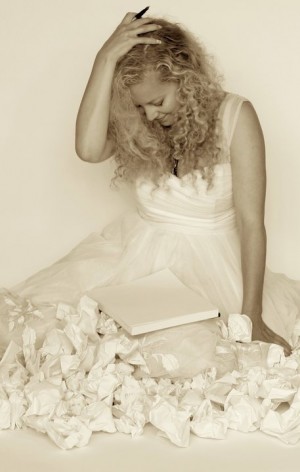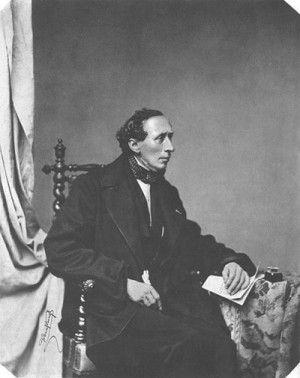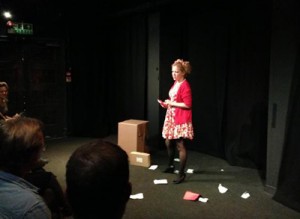You have no items in your cart. Want to get some nice things?
Go shoppingRachel Rose Reid enchanted her audience with a refreshing interpretation of our best-loved fairytales in her show, I’m Hans Christian Anderson, last Friday at the Leicester Square Theatre as part of the London Storytelling Festival. She goes back to the origins of these stories we’ve grown up with, reminding us of the love stories we’ve heard and the love stories we live, and how unrequited love is the most storied love of all.

She cuts an unassuming presence as she enters the stage alone in a flowered summer dress and pink cardigan. It all begins without fanfare or artifice. She makes no dramatic entrance. She simply starts a conversation with her audience.
In the tiny basement of the Leicester Square Theatre in London, I sit knee-to-knee with about fifty other people, barely five metres away from where Rachel Rose Reid stands. She appears down-to-earth, utterly captivating, and soon connects effortlessly with her audience. Even though we don’t speak, we engage, believe, empathise, and create our own truths in our heads as she tells her stories, which revolve around Hans Christian Andersen’s fairytales and what they can tell us about our own lives. And what she has to say is like nothing I’ve ever seen before.
Having won the Young Storyteller of the Year award in 2007 and performed at many venues such as the Soho Theatre and the Barbican, Reid is no stranger to the London spoken word scene. It’s easy to forget that it’s just her on stage as she switches from one character to another, seamlessly turning different voices, facial expressions, and mannerisms on and off as she has a conversation with her alter ego. One second she is the swooning princess who has met her true love, and the next she throws her arms up dramatically, casting shadows against the back of the stage as the evil sea witch, before switching back again to the present to brightly quip, “That’s the Disney version!” It’s clear then that this show won’t be about helpful singing crustaceans; instead, it will take a darker turn, returning to the real, long-obscured origins of the fairytales we’re all so familiar with.
Reid brims with merry wickedness as she unpicks classic fairytale tropes, creating a narrative journey of love, loss and heartbreak. She is able to make us think and see what she thinks and sees, even if there isn’t much by way of props—only a cardboard box and a notebook. She recreates anecdotes from her own life effortlessly, managing to induce laughter with charming self-effacement as she tells us about her love for fairytales as a child, the dreams they induced, and how these dreams were reduced to dust when she was told by well-meaning adults that fairies and princes like these don’t exist. Sure enough, her five-year-old dreams of moving to a castle were confronted by the reality of Slough.
Like most of us, Reid stopped reading fairytales as she grew older. Now in her adult life, however, she finds herself going back to her childhood book of fairytales in times of loss, turmoil and heartbreak. She first picked it up again after hearing about Andersen on the radio when she was at the start of a new love affair, and recalls that as soon as she opened the book and started to read, a flood of memories were unlocked and she started to remember when and where she’d first heard them. The boy in “The Shadow“ wrote about “what was good, what was beautiful, what was true”, she tells us, and so does Andersen, even if the endings of his stories aren’t happy ones, as we’ve come to think. That sugar-coating was all Disney.

Reid delves beneath the surface of the fairytales to the bitter, hard truths, and affords us some clues as to where Andersen may have gotten his inspiration for his stories. It comes to light that Andersen endured several beatings of the heart during his life—so many unrequited loves, both men and women. Reid spoke particularly of his infatuation with Edvard Collin and the rejection and heartbreak that came with it because Collin preferred women. Andersen and Collin started out as friends, and exchanged many letters while Andersen was travelling around Europe. The breaking point came when Andersen confessed to Collin, as Reid quotes, “I languish for you as for a pretty Calabrian wench… my sentiments for you are those of a woman.” As this infatuation was unreciprocated, Collin refused Andersen’s request to use the informal form of address—“you”—in their letters, which was only used for family and close relations in the Danish language at the time.
Interspersing stories from her own tumultuous love life with stories from Andersen’s life, Reid shows us the parallel that runs between Andersen’s hunger for love, his characters’ hunger for love and our hunger for love. She dishes anecdotes on her first 60 seconds with several men (because she’d read in a magazine that the first 60 seconds between two people is supposed to tell how a whole relationship will be), each of them “my first real love”, as she called them—as she had hoped. She amplifies these sketches with familiar themes about relationships we can all identify with: whether it’s waiting for someone to call, figuring out how much you should change yourself for someone, or finding out that an old love is happy with someone new. You really feel as if you are actually seeing Reid’s emotional journey through the show, mirrored cleverly by the turmoil that Andersen faced in his life: it turns out that Andersen had written “The Little Mermaid”, his first published story, when he was avoiding the wedding of the person he loved.
Music plays a part in Reid’s stories as well, and in adding some self-sung extracts of Joni Mitchell songs accompanied by an acoustic guitar track, Reid emphasises how universal music can be, too. Music has the power to express the depth of feeling in a certain moment, to be as potent and evocative as a snapshot, and it’s this feeling that Reid manages to evoke in her stripped-down renditions of “My Old Man” and “A Case of You”.

The show builts up and up to a climax as Reid weaves life stories together with allegory and fable and song, feverishly tearing pages from her notepad as she shatters every single illusion from the web that she has created. Most memorably, she bookends her show by returning to the true Little Mermaid story, where the mermaid does not end up happily ever after with her one true prince, but as foam on the sea after he’d failed to recognise her sacrifice—her tongue being cut out—for legs. In the show’s final moment, Reid turns over the cardboard box, scattering screwed-up balls of paper everywhere before standing in the midst of them looking very frank and vulnerable, telling the audience: “It was over, and that happens to every story.”
In just an hour, Reid managed to make me feel as though barely any time had elapsed, and as if I’d had an individual interaction with her. She is a compelling performer with an ideal mix of wit, humour and emotion, and in this brilliant show, she connects us with our universal search for the happy ending and the pressure that we all put on ourselves to get things “right”, whether it’s making our writing is perfect, finding the role we are meant to fulfil in our lives, or finding—yes, let’s not be afraid to admit it—our “one true love”.
Here’s a video preview of her show by Supporting Wall:
Original direction of I’m Hans Christian Andersen by Phillip Breen.
Follow Rachel Rose Reid on Twitter, Facebook and www.rachelrosereid.com.
You can catch I’m Hans Christian Andersen again on Wednesday, 16 January, 8:30pm as part of First: A Season of Solo Performances at the Tristan Bates Theatre, London.
But before that, Rachel Rose Reid will appear in Brighton with other wordsmiths on 15 November, 7:30pm, at The Quadrant, 12 North Street, BN1 3GJ. Ticket is £4.
 There’s also a lot more going on at the London Storytelling Festival that shouldn’t be missed. It ends 18 November, so catch it while you can!
There’s also a lot more going on at the London Storytelling Festival that shouldn’t be missed. It ends 18 November, so catch it while you can!

About N/A N/A
Emma joined Litro in October 2012 after a string of internships in publishing, PR, and marketing. She looks after the Tumblr and Pinterest accounts, and comes up with cunning plans to gain more subscribers. She also quite happily rambles on any subject that is given to her to turn into a feature. When not writing for Litro, Emma writes children's books, having completed an MA at Winchester University. She is also a keen runner, and is running the London Marathon next year.




